Unit 4 I used to be afraid of the dark Section A(3a-4c) 原创教学课件(共40张PPT)
文档属性
| 名称 | Unit 4 I used to be afraid of the dark Section A(3a-4c) 原创教学课件(共40张PPT) | 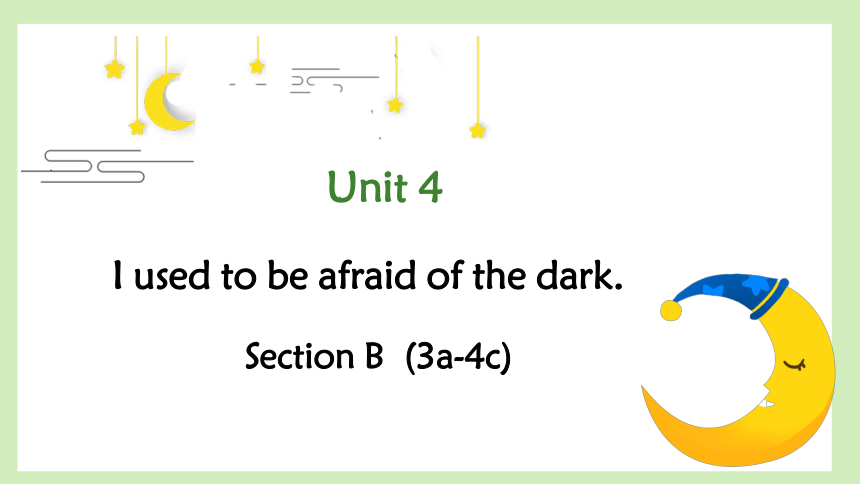 | |
| 格式 | pptx | ||
| 文件大小 | 47.0MB | ||
| 资源类型 | 试卷 | ||
| 版本资源 | 人教新目标(Go for it)版 | ||
| 科目 | 英语 | ||
| 更新时间 | 2022-10-18 19:41:13 | ||
图片预览

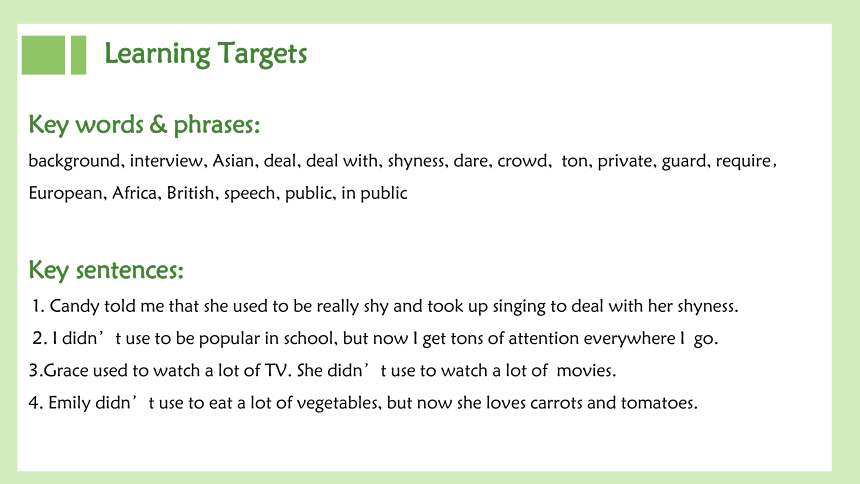
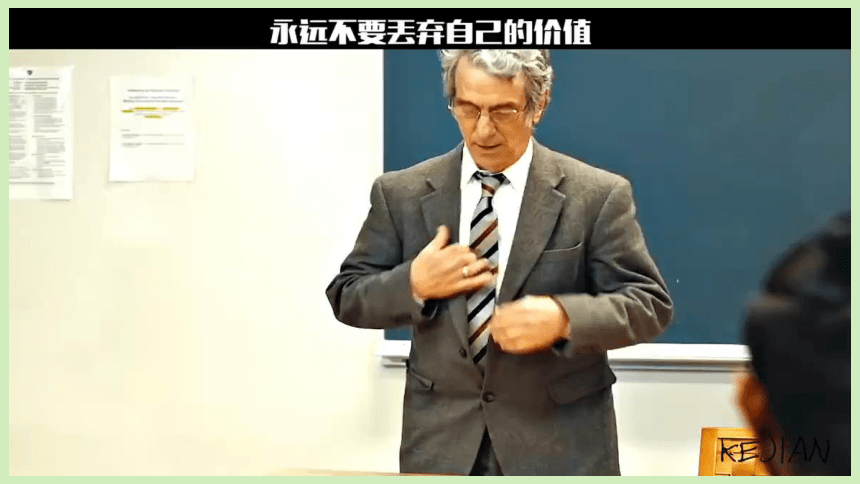
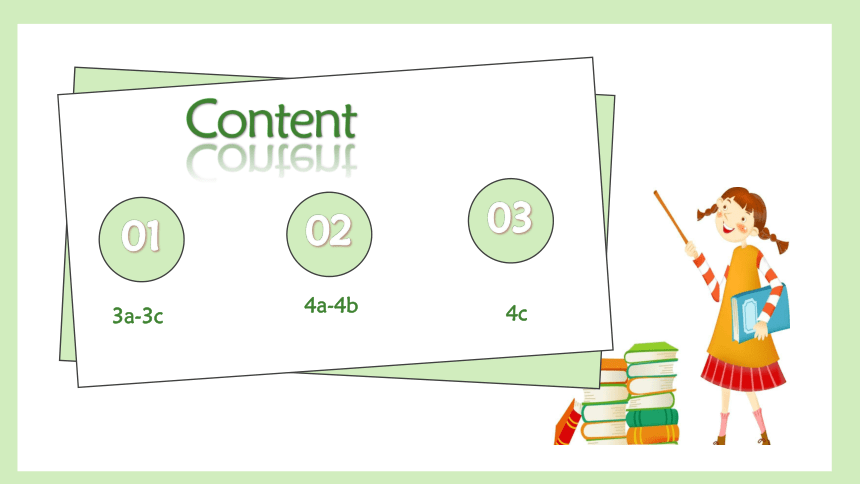
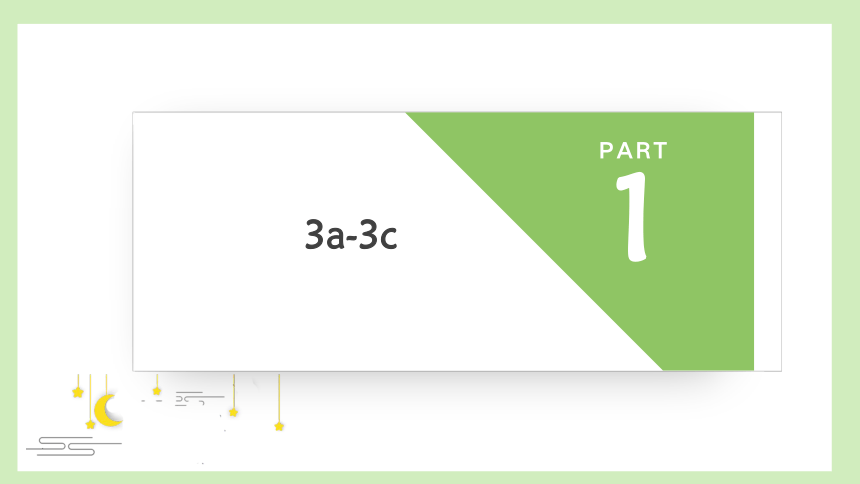
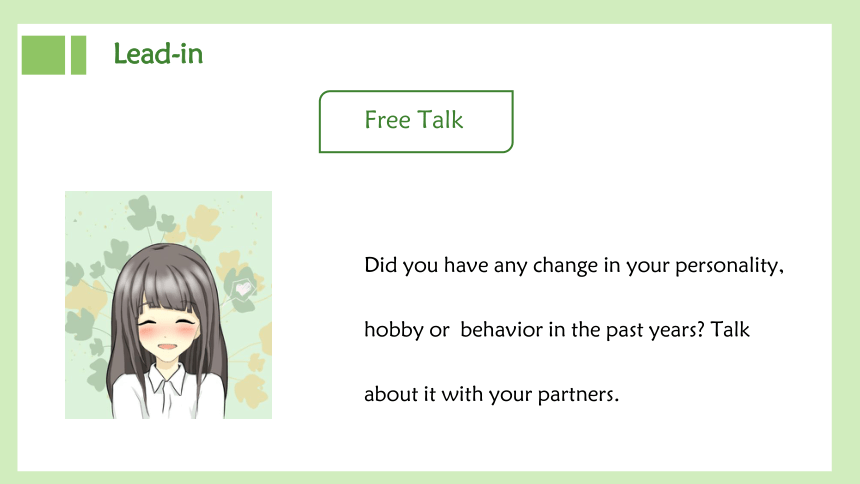
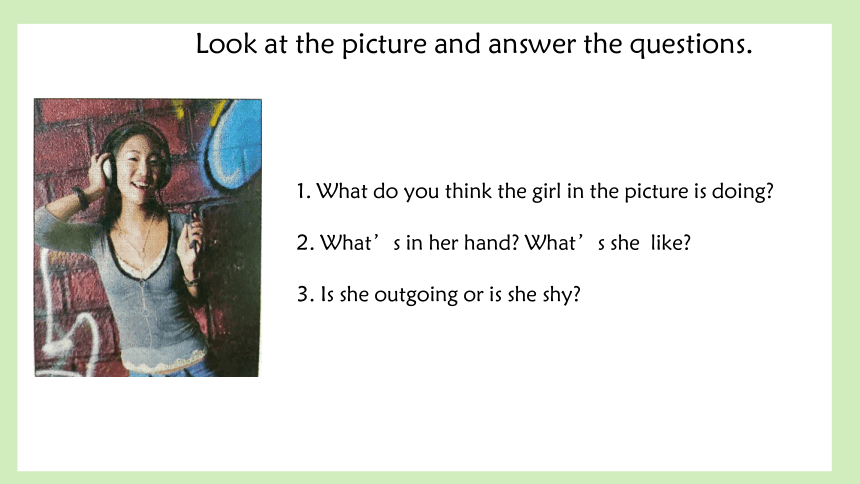
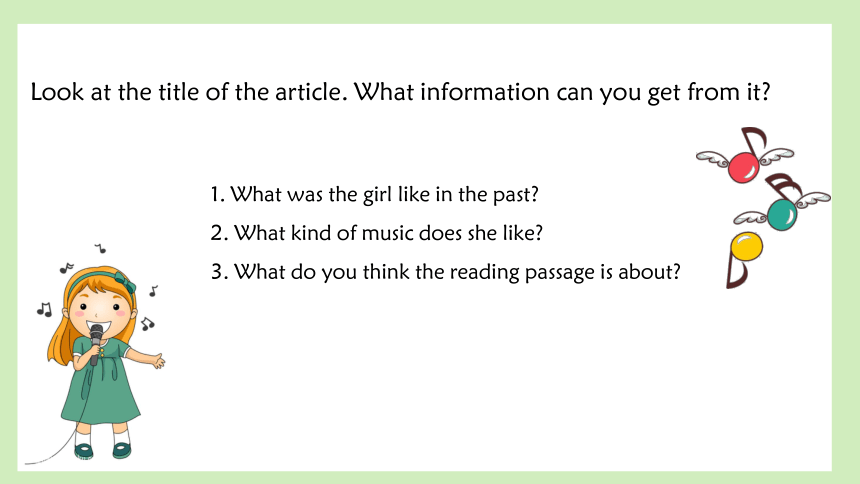
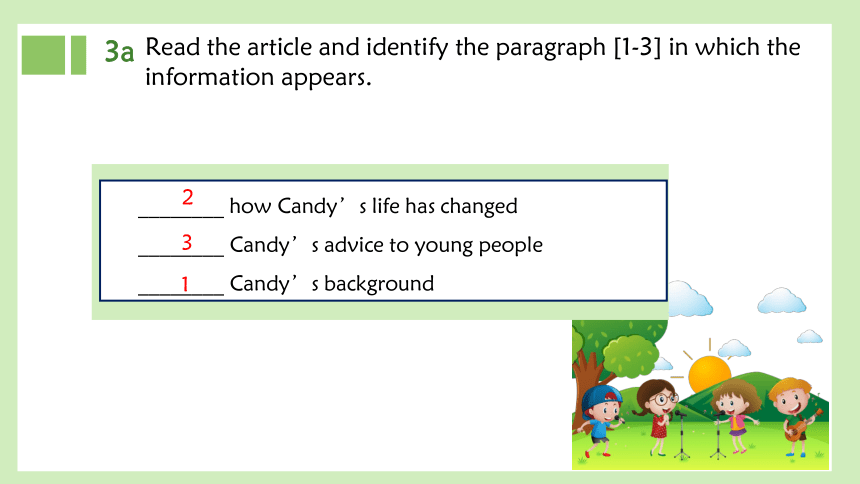
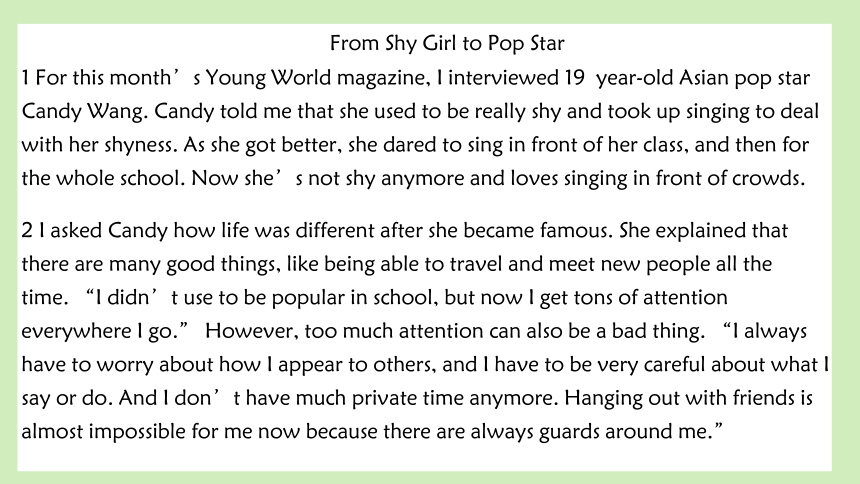
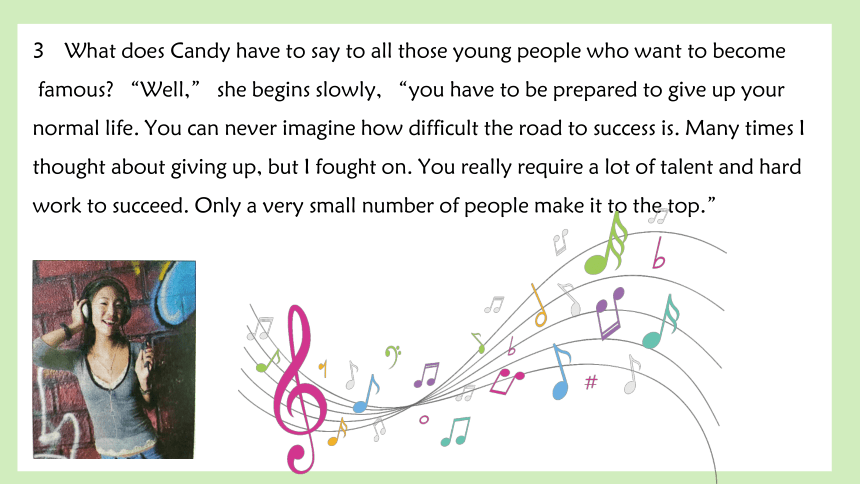
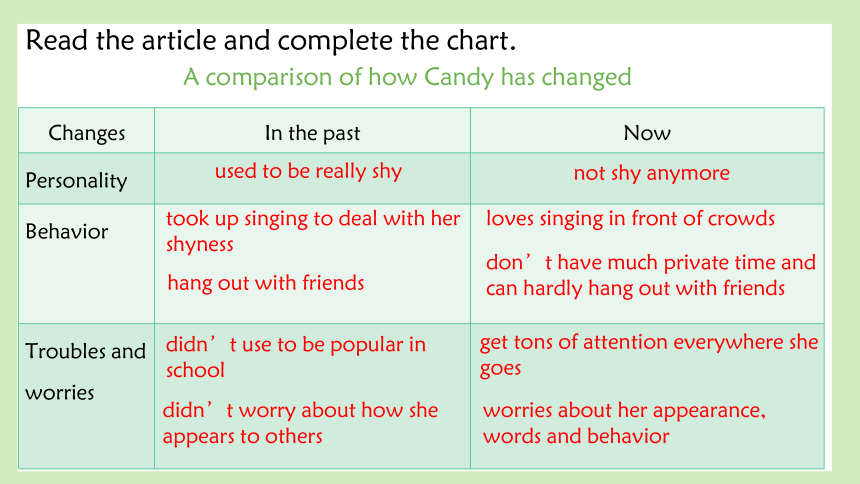
文档简介
(共40张PPT)
I used to be afraid of the dark.
Section B (3a-4c)
Unit 4
Key words & phrases:
background, interview, Asian, deal, deal with, shyness, dare, crowd, ton, private, guard, require, European, Africa, British, speech, public, in public
Learning Targets
Key sentences:
1. Candy told me that she used to be really shy and took up singing to deal with her shyness.
2. I didn’t use to be popular in school, but now I get tons of attention everywhere I go.
3.Grace used to watch a lot of TV. She didn’t use to watch a lot of movies.
4. Emily didn’t use to eat a lot of vegetables, but now she loves carrots and tomatoes.
Content
01
3a-3c
4a-4b
4c
02
03
3a-3c
1
PART
Did you have any change in your personality, hobby or behavior in the past years Talk about it with your partners.
Lead-in
Free Talk
1. What do you think the girl in the picture is doing
2. What’s in her hand What’s she like
3. Is she outgoing or is she shy
Look at the picture and answer the questions.
Look at the title of the article. What information can you get from it
1. What was the girl like in the past
2. What kind of music does she like
3. What do you think the reading passage is about
Read the article and identify the paragraph [1-3] in which the information appears.
________ how Candy’s life has changed
________ Candy’s advice to young people
________ Candy’s background
2
3
1
3a
From Shy Girl to Pop Star
1 For this month’s Young World magazine, I interviewed 19 year-old Asian pop star Candy Wang. Candy told me that she used to be really shy and took up singing to deal with her shyness. As she got better, she dared to sing in front of her class, and then for the whole school. Now she’s not shy anymore and loves singing in front of crowds.
2 I asked Candy how life was different after she became famous. She explained that
there are many good things, like being able to travel and meet new people all the
time. “I didn’t use to be popular in school, but now I get tons of attention
everywhere I go.” However, too much attention can also be a bad thing. “I always
have to worry about how I appear to others, and I have to be very careful about what I
say or do. And I don’t have much private time anymore. Hanging out with friends is
almost impossible for me now because there are always guards around me.”
What does Candy have to say to all those young people who want to become
famous “Well,” she begins slowly, “you have to be prepared to give up your normal life. You can never imagine how difficult the road to success is. Many times I thought about giving up, but I fought on. You really require a lot of talent and hard work to succeed. Only a very small number of people make it to the top.”
Read the article and complete the chart.
A comparison of how Candy has changed
Changes In the past Now
Personality
Behavior
Troubles and worries
used to be really shy
not shy anymore
took up singing to deal with her shyness
hang out with friends
didn’t use to be popular in school
didn’t worry about how she appears to others
loves singing in front of crowds
don’t have much private time and can hardly hang out with friends
get tons of attention everywhere she goes
worries about her appearance, words and behavior
Read the article again and complete the sentences about Candy.
1.She used to be shy, but now she’s not shy ___________.
2.She didn’t use to be ___________ in school, but now she gets lots of attention.
3.She used to ___________ with friends, but it is almost impossible now.
4.She didn’t use to ______________ how she appears to others,
but now she does.
anymore
popular
hang out
worry about
3b
3c
What were you like Why did you take up singing
I used to be really shy. I took up singing to deal with my shyness.
Suppose you are the interviewer and your partner is Candy. Ask and answer questions.
How was your life different after you became famous
There are many good things. I am able to travel and meet new people all the time. I get tons of attention everywhere I go. Too much attention can also be a bad thing. I have to be very careful about what I say or do. And I don’t have much private time anymore. Hanging out with friends is almost impossible.
What’s your advice to all those young people who want to become famous
You have to be prepared to give up your normal life. You can never imagine how difficult the road to success is. You really require a lot of talent and hard work to succeed. Only a very small number of people make it to the top.
Language Point 1
01
02
For this month’s Young World magazine, I interviewed 19-year-old Asian pop star Candy Wang.(教材P27)
interview v. 采访;面试 n. 面试;访谈
interview sb. 采访某人
As a reporter, he interviews all kinds of people.
interview sb. about sth. 就某事采访某人
Many reporters interviewed the brave boy about the fire yesterday.
03
have an interview with sb.
采访某人
The reporter had an interview with the winner of
the competition.
I was thinking to take up dancing. 我正在考虑去学习跳舞。
She took up the guitar at the age of 11.她11岁开始学习吉他。
take up
添加小标题
Language Point 2
Candy told me that she used to be really shy and took up singing to deal with her shyness.(教材P27)
“(通常作为爱好)开始学习,开始练习”,后面可以接名词或动名词(短语)。
take up还有“占据”的意思。
The new couch takes up half of the room.新沙发占去房间的一半。
Language Point 3
③ I didn’t use to be popular in school, but now I get tons of attention
everywhere I go.(教材P27)
后面接可数名词复数
tons of“大量,许多”相当于a lot of。
后面接不可数名词
We have tons of apples left over from the party.
我们的聚会剩下了许多苹果。
The old man gave away tons of money last year.
去年那位老人捐了许多钱。
VS
Language Point 4
④ And I don’t have much private time anymore. (教材P27)
not ... anymore =
no more
一般修饰短暂性动词,表示动作发生的次数、频率不再延续。
not ... any longer =
no longer
一般修饰延续性动词,表示动作、状态或
时间不再延续。
I don’t do yoga anymore.
我不再做瑜伽了。
He does not live here any longer.
他不再住在这里了
the road to success
to be on / along the road to ...
Language Point 5
⑤ You can never imagine how difficult the road to success is.(教材P27)
“通向成功的路”,其中to是介词,后面跟名词或v.-ing形式。
Failures show us the road to success.
失败为我们指明了成功之路。
表达出“快速地;不多久”这样的意思,汉语通常译作“很快就要......;不久就会......”。
Many animals are on the road to extinction because of humans.
许多动物因为人类即将灭绝。
添加文字
⑥ You really require a lot of talent and hard work to succeed. (教材P11)
Language Point 6
require v. 需要; 要求
require sth. 需要某物
Students at this level require a lot of help.
这个水平的学生需要很多帮助。
require sb. to do sth.
要求某人做某事
The teacher required Tom to keep quiet.
老师要求汤姆保持安静。
require + that从句(从句的谓语动词用“should + 动词原形”,should可以省略)
The law requires that everyone (should) pay the tax.
法律要求人人纳税。
⑦ Only a very small number of people make it to the top.(教材P27)
a small number of 一小部分, a number of短语中number的前面可以加修饰词small或large来表示数量的大小。
Language Point 7
辨析:a number of与the number of
a number of 意为“许多;大量”,后面接可数名词复数。作主语时谓语动词用复数。
the number of 意为“……的数量”,后接可数名词复数。作主语时谓语动词用单数。
A small number of children are educated at home.少数孩子在家接受教育。
The number of the students in our class is 40. 我们班学生的人数是40。
4a-4b
2
PART
Grammar Focus
Read the sentences.
I used to be short. I didn’t use to be popular in school.
Paula used to be really quiet. She didn’t use to like tests.
You used to be short, didn’t you Yes, I did. / No, I didn’t.
Did he use to wear glasses Yes, he did. / No, he didn’t.
Can you find out more sentences that contain “used to” in section A
Affirmative sentences (肯定句)
Negative sentences(否定句)
Interrogative sentences(疑问句)
Disjunctive questions(反义疑问句)
I used to see him reading in the library every day.
Candy told me that she used to be really shy and took up singing to deal with her shyness.
She didn’t use to worry about how she appears to others, but now she does.
Did Mario use to be short
Mario, you used to be short, didn’t you
一.used to的用法
含义
“过去常常”
用法
用于表示过去习惯性的动作或存在的状态(强调与现在的对比,暗示现在不做了)。其中to为不定式符号,后面跟动词原形。
时态
used to只用于一般过去时态,没有人称和数的变化。
e.g. Tom used to be thin, but now
he’s big and strong.
Tom以前很瘦,但现在他又高又壮。
例:My mother used not to spend time cooking in the kitchen.
=My mother didn't use to spend time cooking in the kitchen.
我妈妈过去不常花时间做饭。
1. 否定句
used not
主语 + to do sth.
didn’t use
二. used to的句式变化
2. 一般疑问句
Did+ 主语 + use + to do…
例:—Did you use to swim in the river 你过去
常常去河里游泳吗?
—Yes, I did.是的,我常常去。
答语:Yes, 主语+ did. / No, 主语+ didn’t.
3. 反意疑问句
含有used to结构的肯定句变为反意疑问句时,其疑问部分为“ didn’t/usedn't +人称代词?”
例:Your grandparents used to live in the countryside, didn't/usedn't they
你祖父母过去常常住在乡下,不是吗?
【拓展】
used to do sth. 过去常常做某事
get / be used to doing sth. 习惯于做某事
be used to do sth. 被用来做某事
be used for doing sth. 被用来做某事
Write sentences about the past using used to.
Grace / watch a lot of TV / watch a lot of movies
Grace used to watch a lot of TV. She didn’t use to watch a lot of movies.
2. my mom / have curly hair / have straight hair
_________________________________________________________________________
My mom used to have curly hair. She didn’t use to have straight hair.
4a
3. Jerry / read books on European history / read books on African culture
________________________________________________________________________
________________________________________________________________________
4. Sandy / teach British English / teach American English
_______________________________________________________________________
Jerry used to read books on European history.He didn’t use to read books on
African culture.
Sandy used to teach British English. She didn’t use to teach American English.
Look at the information and write sentences about Emily.
Five years ago Now
didn’t eat a lot of vegetables loves carrots and tomatoes
listened to pop music enjoys country music
watched scary movies hates scary movies
didn’t read a lot of books reads at least six books a year.
e.g. Emily didn’t use to eat a lot of vegetables, but now she loves carrots and tomatoes.
4b
1. Emily used to listen to pop music, but now she enjoys country music.
3. Emily didn’t use to read a lot of books, but now she reads at least six books a year.
2. Emily used to watch scary movies, but now she hates scary movies.
4c
3
PART
Which of these things did you use to be afraid of Which ones are you still afraid of Check the boxes and then ask your partner.
4c
Me My partner
I used to be afraid of… I’m still afraid of… My partner used to be afraid of… My partner is still afraid of…
the dark
being alone
flying
high places
giving a speech in public
一、完成句子
1. Mr Black _____________________ (以前是一位医生), but now he is a singer.
2. Did your father _________________ (过去常常看电视) after supper
3. You used to have long curly hair, ___________ (不是吗)
4. I ____________________________ (以前常常骑自行车去上学), but now I
______________________________ (习惯走着去).
used to be a doctor
use to watch TV
didn’t you
used to go to school by bike
am used to walking to school
Exercise
二、单项选择。
1.— Do you like playing computer games
— No, but I _____.
A. used to B. didn’t C. do D. don’t
2. — My father has decided to _____ smoking.
— That’s good news for us. I hope so.
A. give up B. take out C. give in D. turn off
3. —I don’t know how to____the old books.
—Why not give them away to poor children
A. hand out B. give up C. deal with D. take up
A
A
C
03
1.Learned how to express one’s differences between the past and now.
01
2. Catch the key information during reading.
02
Learned some words and expressions
Summary
I used to be afraid of the dark.
Section B (1a-4e)
Unit 4
Next
I used to be afraid of the dark.
Section B (3a-4c)
Unit 4
Key words & phrases:
background, interview, Asian, deal, deal with, shyness, dare, crowd, ton, private, guard, require, European, Africa, British, speech, public, in public
Learning Targets
Key sentences:
1. Candy told me that she used to be really shy and took up singing to deal with her shyness.
2. I didn’t use to be popular in school, but now I get tons of attention everywhere I go.
3.Grace used to watch a lot of TV. She didn’t use to watch a lot of movies.
4. Emily didn’t use to eat a lot of vegetables, but now she loves carrots and tomatoes.
Content
01
3a-3c
4a-4b
4c
02
03
3a-3c
1
PART
Did you have any change in your personality, hobby or behavior in the past years Talk about it with your partners.
Lead-in
Free Talk
1. What do you think the girl in the picture is doing
2. What’s in her hand What’s she like
3. Is she outgoing or is she shy
Look at the picture and answer the questions.
Look at the title of the article. What information can you get from it
1. What was the girl like in the past
2. What kind of music does she like
3. What do you think the reading passage is about
Read the article and identify the paragraph [1-3] in which the information appears.
________ how Candy’s life has changed
________ Candy’s advice to young people
________ Candy’s background
2
3
1
3a
From Shy Girl to Pop Star
1 For this month’s Young World magazine, I interviewed 19 year-old Asian pop star Candy Wang. Candy told me that she used to be really shy and took up singing to deal with her shyness. As she got better, she dared to sing in front of her class, and then for the whole school. Now she’s not shy anymore and loves singing in front of crowds.
2 I asked Candy how life was different after she became famous. She explained that
there are many good things, like being able to travel and meet new people all the
time. “I didn’t use to be popular in school, but now I get tons of attention
everywhere I go.” However, too much attention can also be a bad thing. “I always
have to worry about how I appear to others, and I have to be very careful about what I
say or do. And I don’t have much private time anymore. Hanging out with friends is
almost impossible for me now because there are always guards around me.”
What does Candy have to say to all those young people who want to become
famous “Well,” she begins slowly, “you have to be prepared to give up your normal life. You can never imagine how difficult the road to success is. Many times I thought about giving up, but I fought on. You really require a lot of talent and hard work to succeed. Only a very small number of people make it to the top.”
Read the article and complete the chart.
A comparison of how Candy has changed
Changes In the past Now
Personality
Behavior
Troubles and worries
used to be really shy
not shy anymore
took up singing to deal with her shyness
hang out with friends
didn’t use to be popular in school
didn’t worry about how she appears to others
loves singing in front of crowds
don’t have much private time and can hardly hang out with friends
get tons of attention everywhere she goes
worries about her appearance, words and behavior
Read the article again and complete the sentences about Candy.
1.She used to be shy, but now she’s not shy ___________.
2.She didn’t use to be ___________ in school, but now she gets lots of attention.
3.She used to ___________ with friends, but it is almost impossible now.
4.She didn’t use to ______________ how she appears to others,
but now she does.
anymore
popular
hang out
worry about
3b
3c
What were you like Why did you take up singing
I used to be really shy. I took up singing to deal with my shyness.
Suppose you are the interviewer and your partner is Candy. Ask and answer questions.
How was your life different after you became famous
There are many good things. I am able to travel and meet new people all the time. I get tons of attention everywhere I go. Too much attention can also be a bad thing. I have to be very careful about what I say or do. And I don’t have much private time anymore. Hanging out with friends is almost impossible.
What’s your advice to all those young people who want to become famous
You have to be prepared to give up your normal life. You can never imagine how difficult the road to success is. You really require a lot of talent and hard work to succeed. Only a very small number of people make it to the top.
Language Point 1
01
02
For this month’s Young World magazine, I interviewed 19-year-old Asian pop star Candy Wang.(教材P27)
interview v. 采访;面试 n. 面试;访谈
interview sb. 采访某人
As a reporter, he interviews all kinds of people.
interview sb. about sth. 就某事采访某人
Many reporters interviewed the brave boy about the fire yesterday.
03
have an interview with sb.
采访某人
The reporter had an interview with the winner of
the competition.
I was thinking to take up dancing. 我正在考虑去学习跳舞。
She took up the guitar at the age of 11.她11岁开始学习吉他。
take up
添加小标题
Language Point 2
Candy told me that she used to be really shy and took up singing to deal with her shyness.(教材P27)
“(通常作为爱好)开始学习,开始练习”,后面可以接名词或动名词(短语)。
take up还有“占据”的意思。
The new couch takes up half of the room.新沙发占去房间的一半。
Language Point 3
③ I didn’t use to be popular in school, but now I get tons of attention
everywhere I go.(教材P27)
后面接可数名词复数
tons of“大量,许多”相当于a lot of。
后面接不可数名词
We have tons of apples left over from the party.
我们的聚会剩下了许多苹果。
The old man gave away tons of money last year.
去年那位老人捐了许多钱。
VS
Language Point 4
④ And I don’t have much private time anymore. (教材P27)
not ... anymore =
no more
一般修饰短暂性动词,表示动作发生的次数、频率不再延续。
not ... any longer =
no longer
一般修饰延续性动词,表示动作、状态或
时间不再延续。
I don’t do yoga anymore.
我不再做瑜伽了。
He does not live here any longer.
他不再住在这里了
the road to success
to be on / along the road to ...
Language Point 5
⑤ You can never imagine how difficult the road to success is.(教材P27)
“通向成功的路”,其中to是介词,后面跟名词或v.-ing形式。
Failures show us the road to success.
失败为我们指明了成功之路。
表达出“快速地;不多久”这样的意思,汉语通常译作“很快就要......;不久就会......”。
Many animals are on the road to extinction because of humans.
许多动物因为人类即将灭绝。
添加文字
⑥ You really require a lot of talent and hard work to succeed. (教材P11)
Language Point 6
require v. 需要; 要求
require sth. 需要某物
Students at this level require a lot of help.
这个水平的学生需要很多帮助。
require sb. to do sth.
要求某人做某事
The teacher required Tom to keep quiet.
老师要求汤姆保持安静。
require + that从句(从句的谓语动词用“should + 动词原形”,should可以省略)
The law requires that everyone (should) pay the tax.
法律要求人人纳税。
⑦ Only a very small number of people make it to the top.(教材P27)
a small number of 一小部分, a number of短语中number的前面可以加修饰词small或large来表示数量的大小。
Language Point 7
辨析:a number of与the number of
a number of 意为“许多;大量”,后面接可数名词复数。作主语时谓语动词用复数。
the number of 意为“……的数量”,后接可数名词复数。作主语时谓语动词用单数。
A small number of children are educated at home.少数孩子在家接受教育。
The number of the students in our class is 40. 我们班学生的人数是40。
4a-4b
2
PART
Grammar Focus
Read the sentences.
I used to be short. I didn’t use to be popular in school.
Paula used to be really quiet. She didn’t use to like tests.
You used to be short, didn’t you Yes, I did. / No, I didn’t.
Did he use to wear glasses Yes, he did. / No, he didn’t.
Can you find out more sentences that contain “used to” in section A
Affirmative sentences (肯定句)
Negative sentences(否定句)
Interrogative sentences(疑问句)
Disjunctive questions(反义疑问句)
I used to see him reading in the library every day.
Candy told me that she used to be really shy and took up singing to deal with her shyness.
She didn’t use to worry about how she appears to others, but now she does.
Did Mario use to be short
Mario, you used to be short, didn’t you
一.used to的用法
含义
“过去常常”
用法
用于表示过去习惯性的动作或存在的状态(强调与现在的对比,暗示现在不做了)。其中to为不定式符号,后面跟动词原形。
时态
used to只用于一般过去时态,没有人称和数的变化。
e.g. Tom used to be thin, but now
he’s big and strong.
Tom以前很瘦,但现在他又高又壮。
例:My mother used not to spend time cooking in the kitchen.
=My mother didn't use to spend time cooking in the kitchen.
我妈妈过去不常花时间做饭。
1. 否定句
used not
主语 + to do sth.
didn’t use
二. used to的句式变化
2. 一般疑问句
Did+ 主语 + use + to do…
例:—Did you use to swim in the river 你过去
常常去河里游泳吗?
—Yes, I did.是的,我常常去。
答语:Yes, 主语+ did. / No, 主语+ didn’t.
3. 反意疑问句
含有used to结构的肯定句变为反意疑问句时,其疑问部分为“ didn’t/usedn't +人称代词?”
例:Your grandparents used to live in the countryside, didn't/usedn't they
你祖父母过去常常住在乡下,不是吗?
【拓展】
used to do sth. 过去常常做某事
get / be used to doing sth. 习惯于做某事
be used to do sth. 被用来做某事
be used for doing sth. 被用来做某事
Write sentences about the past using used to.
Grace / watch a lot of TV / watch a lot of movies
Grace used to watch a lot of TV. She didn’t use to watch a lot of movies.
2. my mom / have curly hair / have straight hair
_________________________________________________________________________
My mom used to have curly hair. She didn’t use to have straight hair.
4a
3. Jerry / read books on European history / read books on African culture
________________________________________________________________________
________________________________________________________________________
4. Sandy / teach British English / teach American English
_______________________________________________________________________
Jerry used to read books on European history.He didn’t use to read books on
African culture.
Sandy used to teach British English. She didn’t use to teach American English.
Look at the information and write sentences about Emily.
Five years ago Now
didn’t eat a lot of vegetables loves carrots and tomatoes
listened to pop music enjoys country music
watched scary movies hates scary movies
didn’t read a lot of books reads at least six books a year.
e.g. Emily didn’t use to eat a lot of vegetables, but now she loves carrots and tomatoes.
4b
1. Emily used to listen to pop music, but now she enjoys country music.
3. Emily didn’t use to read a lot of books, but now she reads at least six books a year.
2. Emily used to watch scary movies, but now she hates scary movies.
4c
3
PART
Which of these things did you use to be afraid of Which ones are you still afraid of Check the boxes and then ask your partner.
4c
Me My partner
I used to be afraid of… I’m still afraid of… My partner used to be afraid of… My partner is still afraid of…
the dark
being alone
flying
high places
giving a speech in public
一、完成句子
1. Mr Black _____________________ (以前是一位医生), but now he is a singer.
2. Did your father _________________ (过去常常看电视) after supper
3. You used to have long curly hair, ___________ (不是吗)
4. I ____________________________ (以前常常骑自行车去上学), but now I
______________________________ (习惯走着去).
used to be a doctor
use to watch TV
didn’t you
used to go to school by bike
am used to walking to school
Exercise
二、单项选择。
1.— Do you like playing computer games
— No, but I _____.
A. used to B. didn’t C. do D. don’t
2. — My father has decided to _____ smoking.
— That’s good news for us. I hope so.
A. give up B. take out C. give in D. turn off
3. —I don’t know how to____the old books.
—Why not give them away to poor children
A. hand out B. give up C. deal with D. take up
A
A
C
03
1.Learned how to express one’s differences between the past and now.
01
2. Catch the key information during reading.
02
Learned some words and expressions
Summary
I used to be afraid of the dark.
Section B (1a-4e)
Unit 4
Next
同课章节目录
- Unit 1 How can we become good learners.
- Section A
- Section B
- Unit 2 I think that mooncakes are delicious!
- Section A
- Section B
- Unit 3 Could you please tell me where the restroom
- Section A
- Section B
- Unit 4 I used to be afraid of the dark.
- Section A
- Section B
- Unit 5 What are the shirts made of?
- Section A
- Section B
- Review of Units 1-5
- Unit 6 When was it invented?
- Section A
- Section B
- Unit 7 Teenagers should be allowed to choose their
- Section A
- Section B
- Unit 8 It must belong to Carla.
- Section A
- Section B
- Unit 9 I like music that I can dance to.
- Section A
- Section B
- Unit 10 You're supposed to shake hands.
- Section A
- Section B
- Review of Units 6-10
- Unit 11 Sad movies make me cry.
- Section A
- Section B
- Unit 12 Life is full of the unexpected
- Section A
- Section B
- Unit 13 We're trying to save the earth!
- Section A
- Section B
- Unit 14 I remember meeting all of you in Grade 7.
- Section A
- Section B
- Review of Units 11-14
